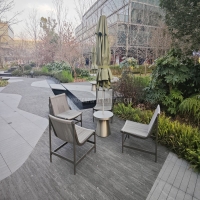Welcome to the website for landscape facilities products and knowledge.
What are the key differences between hand-tied and machine-tied rope seats in landscape chairs?
When choosing landscape chairs, the type of rope seat—whether hand-tied or machine-tied—can significantly impact durability, comfort, and aesthetics. Here’s a breakdown of their key differences:
1. Craftsmanship & Aesthetics:
- Hand-tied rope seats are meticulously crafted by artisans, resulting in unique, irregular patterns that add a rustic charm.
- Machine-tied seats feature uniform knots and consistent tension, offering a sleek, modern look.
2. Durability:
- Hand-tied seats often use thicker, high-quality ropes and tighter knots, making them more resistant to wear over time.
- Machine-tied seats may use thinner ropes and standardized knots, which can loosen faster with heavy use.
3. Comfort & Flexibility:
- Hand-tied seats adapt better to body contours due to slight variations in tension, providing a more personalized feel.
- Machine-tied seats offer firmer support but may feel less flexible.
4. Maintenance & Longevity:
- Hand-tied seats require occasional re-tightening but generally last longer with proper care.
- Machine-tied seats are low-maintenance but may need replacement sooner if knots degrade.
5. Cost & Availability:
- Hand-tied seats are pricier due to labor-intensive craftsmanship.
- Machine-tied seats are more affordable and widely available.
Ultimately, the choice depends on your priorities: hand-tied for artisanal quality and longevity, or machine-tied for budget-friendly convenience.
Related search:

Recommendation
Metal structure rattan chair without armrests for single person, with woven seat and backrest.